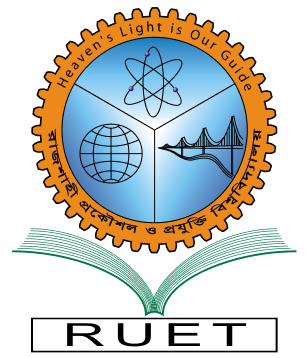RUET, positioned as an upstream guardian on the Padma River, actively advances Sustainable Development Goal 14 by focusing on the prevention of land-based pollution, protection of freshwater quality, and development of skilled capacity for sustainable aquatic resource management.
Academic Curriculum and Capacity Building
Interdisciplinary Courses: The departments of Civil Engineering (CE) and Urban & Regional Planning (URP) offer specialized courses addressing critical aspects of water sustainability—such as Water Quality Modelling, Stormwater Treatment System Design, and Wastewater Recycling.
Spatial Analysis and Remote Sensing: Students are trained in advanced spatial tools (GIS, Remote Sensing) for practical applications, including riverbank erosion monitoring and Padma basin water-quality analysis.
Environmental Stewardship Focus: The programs nurture environmentally responsible engineers and planners equipped to implement data-driven water-habitat protection strategies.
Applied Research and Pollution Control
Advanced Wastewater Treatment: CE department researchers are developing and testing Multimedia Filtration Systems for efficient municipal wastewater remediation.
Ecological Engineering Innovations: RUET scientists explore biochar-based contaminant removal from stormwater—integrating indigenous materials into eco-friendly pollutant-control systems.
Riverine Management Studies: Ongoing research on morphological transformations of the Lower Padma Basin provides valuable insights for national-scale erosion mitigation and sustainable water-resource planning.
Campus Sustainability and Circular Economy Initiatives
“RUET Mission Plastics” Initiative: A student-led campaign that promotes plastic recycling and upcycling through on-campus processing units (plastic shredder and extruder), addressing plastic pollution at its source.
Waste Valorization Research: RUET researchers are developing processes to recycle hazardous flexible plastic-laminated metal packaging into usable, value-added materials.
Incentivized Recycling Systems: Plans are underway to deploy Reverse Vending Machines (RVMs) across student dormitories, encouraging PET-bottle recycling and promoting a culture of sustainable waste management.
Impact & Next Steps
Through a blend of technical education, applied environmental research, and innovative recycling practices, RUET is shaping a new generation of engineers and researchers dedicated to aquatic ecosystem preservation.
Planned directions for improvement include:
1. Expanding research collaboration on riverine ecosystem management with national and international institutions.
2. Quantifying outcomes—such as wastewater recycled (m³/year), plastic recovered (kg/year), and number of students engaged in water-resource projects.
3. Introducing campus-based water laboratories and Padma River monitoring hubs for real-time data collection and community-driven conservation.
4. Hosting annual “Blue Innovation Challenge” competitions to engage students and local communities in developing sustainable water and waste-management solutions.
